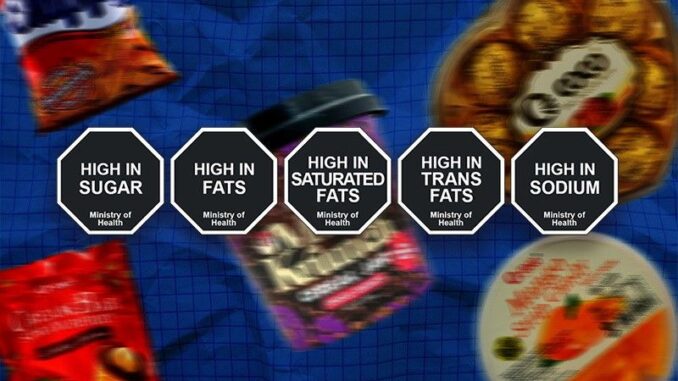
MANILA, Philippines — Health advocates urged Congress on Friday, November 8, to pass the Healthy Food Marketing Environment Bill, which mandates front-of-package labels on food products to promote healthier consumption behaviors.
With noncommunicable diseases like diabetes and hypertension on the rise, even among children, health and legal experts argue that nutrition labels alone are insufficient to inform consumers about high sodium, sugar or unhealthy fat content.
“With ultra-processed foods high in sugar, sodium, and unhealthy fats proliferating the market at an alarming rate, we must recognize that the system is failing,” Healthy Philippines Alliance lead convenor Jaime Galvez Tan said.
How food warning labels work
Food and beverage packaging typically includes a nutrition facts table, detailing the calorie count per serving, servings per container, nutrient content such as fat and sodium, and the percentage of daily value, indicating how much a nutrient in a serving contributes to the daily diet.
However, health experts said these labels often fail to clearly indicate whether a nutrient exceeds recommended limits and poses a risk of noncommunicable diseases.
This is why the Healthy Philippines Alliance, together with the HealthJustice Philippines and ImagineLaw, is pushing for black octagonal front-of-package labels, believing they will offer an “easily digestible” indication of a product’s nutrient levels.
Philstar.com / Dominique Nicole Flores
“So, the front-of-package food warning label is most significant for those who don’t have time to read the nutrition facts. It allows them to easily see it right on the front of packaged or bottled food, saving time, especially since parents often say they don’t have time to read,” Diabetes Philippines Board of Trustee Jennina Duatin said in Filipino.
Tan also clarified that food warning labels are not telling consumers to stop eating a product, but rather encouraging them to be more mindful of their consumption.
“I think we’re not saying for them to stop eating it, but to be aware that instead of eating it five times a day, you only eat it once,” he told Philstar.com in an ambush interview.
Impact on food companies
Tan added that food warning labels should not be feared, as they will ultimately encourage greater product variety with healthier alternatives or reformulated content.
Citing international studies on the effectiveness of these labels, ImagineLaw project manager Laurence Millan said that Peru had seen companies change their product compositions to remove warning labels.
“When warning labels were introduced on products, 28% of them were reformulated. This means the composition of the food was changed to remove the warning labels, meaning food is now healthier,” Millan said in a mix of English and Filipino.
This has also led to a shift in consumer behavior among Peruvians, he added.
If food warning labels are implemented in the Philippines, Millan said, it would further “strengthen existing regulatory systems” while also allowing businesses to take advantage of “a new demand” among Filipinos.
“Companies now can develop new products that can cater to that new demand because of the warning labels. Because more people will try to demand that for a healthier food product,” he said.
However, health groups acknowledge that food companies may oppose warning labels, as they could discourage consumers from purchasing their products, potentially reducing profits.
More policies needed to protect Filipino health
Food warning labels do not attempt to solve all health-related issues, advocates said. It is just one of the many policies needed to promote healthier lifestyles.
“There is no silver bullet in policymaking. We don’t have a ‘one-shot-kill’ policy that once it is implemented, will solve everything. It’s always a package of policies,” Millan said.
Tan also said that working towards reducing the incidence of non-communicable diseases, especially among the youth, should be done “one step at a time.”
Other interventions could include taxing products with nutrient content exceeding healthy limits, similar to excise taxes on tobacco and alcohol, Tan added.
In the House of Representatives, House Bill 9819, filed by Rep. Reynolds Michael Tan (Samar, 2nd District), has been pending with the Health Committee since January 29.
Meanwhile, its Senate counterpart, Senate Bill 2700, filed by Sen. Risa Hontiveros, has been awaiting committee reading since July 29.
“We are already losing too many lives to preventable diseases. The question we need to ask ourselves is simple: how many more are we willing to lose before we act?” Tan said.



Be the first to comment